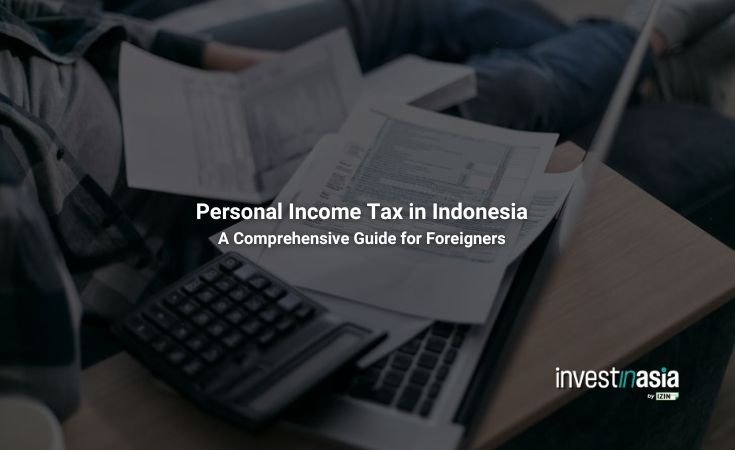Navigating personal income tax in Indonesia is essential for expats living or working in the country. Understanding tax residency rules and filing obligations can help ensure compliance and avoid penalties.
Whether you’re a newcomer or a long-term resident, this guide provides key insights into Indonesia’s personal income tax system, offering clarity on rates, exemptions, and reporting requirements tailored to expats.
Overview of Personal Income Tax in Indonesia


Indonesia imposes personal income tax (PIT) on a progressive scale ranging from 5% to 35%. Both residents and non-residents are subject to taxation based on their income sources and residency status. Understanding these regulations is crucial for anyone living or working in Indonesia, especially expatriates.
Also read: Understanding Indonesia’s Tax Bracket System (Latest Update)
Residency Status and Tax Obligations
The tax residency status determines whether an individual’s global or local income is subject to Indonesian tax laws. According to the Directorate General of Taxes (DGT):
- Tax Residents: A person is considered a tax resident of Indonesia if they reside in the country for more than 183 days in any 12-month span or express an intention to make Indonesia their permanent home. Tax residents are generally taxed on their worldwide income, although exemptions apply for foreign-sourced income under specific conditions.
- Non-Tax Residents: Non-residents are taxed at a flat rate of 20% on their Indonesian-sourced income.
Also read: Withholding Tax in Indonesia: Complete Guide for Foreigners
Indonesia Personal Income Tax Rates
The following progressive rates apply to residents’ taxable income:
| Taxable Income (IDR) | Tax Rate (%) |
|---|---|
| Up to 60 million | 5 |
| 60 million – 250 million | 15 |
| 250 million – 500 million | 25 |
| 500 million – 5 billion | 30 |
| Above 5 billion | 35 |
Non-residents face a flat withholding tax of 20% on gross income earned in Indonesia.
Also read: Indonesia’s PPN Guide: Rules, VAT Rates, Calculation
Key Deductions and Reliefs
Indonesian tax laws allow deductions for resident taxpayers, which include:
- Basic Deduction: IDR 54 million annually.
- Spousal Deduction: Additional IDR 4.5 million.
- Dependent Deduction: IDR 4.5 million per dependent, up to three dependents.
Employers are responsible for withholding taxes on employees’ salaries, and taxpayers must file annual returns by March 31 of the following year.
Special Considerations for Expatriates
Foreigners working in Indonesia are subject to specific provisions:
- Territorial Taxation: For the first four years of residency, foreign nationals who meet skill requirements may only be taxed on their Indonesian-sourced income, even if paid offshore.
- Double Taxation Agreements (DTAs): Indonesia’s tax treaties with various countries can reduce or eliminate tax liabilities for certain types of income.
- Exemptions: Certain foreign professionals, such as diplomats and international organization employees, are exempt from PIT regardless of their residency status.
- Self-Assessment Scheme: Expatriates must determine their tax liabilities through self-assessment, often requiring professional assistance to ensure compliance.
Also read: Tax Treaty Indonesia: Countries List and Complete Guide
Filing Requirements for Foreigners


To comply with Indonesian tax laws, expatriates should:
- Register for a Taxpayer Identification Number (NPWP).
- File annual tax returns, even if their income is entirely withheld at source.
- Ensure timely payments of any additional liabilities.
Severance and Pension Payments
Severance and pension payments are taxed at separate final rates:
Severance Payments
| Taxable Income (IDR) | Tax Rate (%) |
| Up to 50 million | 0 |
| 50 million – 100 million | 5 |
| 100 million – 500 million | 15 |
| Above 500 million | 25 |
Pension Payments
| Taxable Income (IDR) | Tax Rate (%) |
| Up to 50 million | 0 |
| Above 50 million | 5 |
Also read: Progressive Tax in Indonesia: Complete Guide for Expats
Tax Planning for Expatriates
Effective tax planning is essential for expatriates to minimize liabilities and ensure compliance. Key strategies include:
- Utilizing DTAs to avoid double taxation.
- Applying for territorial taxation within the first four years of residency.
- Seeking professional advice for accurate self-assessments and filing.
Understanding Indonesia’s personal income tax system is crucial for both residents and expatriates. While the system may seem complex, proper planning and professional guidance can help individuals navigate their obligations effectively. For the most accurate and updated information, consult with a registered local tax advisor or refer to official resources like the Directorate General of Taxes.
Rely on an Experienced Tax Consultant for Your Tax Matters
Understanding Indonesia’s tax obligations can be challenging due to its evolving laws and policies. Foreign businesses and individuals often benefit from working with local tax consultants who offer expertise on regulatory compliance, tax calculations, and legal obligations.
Partnering with a reputable consultant like InvestinAsia’s Indonesia tax consultant and compliance services can simplify your tax management and ensure full compliance with Indonesian tax laws.
Our experienced team of professionals is ready to assist you in every tax matter, such as:
- Accounting and tax reporting services in Indonesia
- Indonesia Payroll Service
- Indonesia LKPM Reporting Service
- Indonesia VAT Taxpayers Registration
Contact us now for FREE consultation and special package!
References



